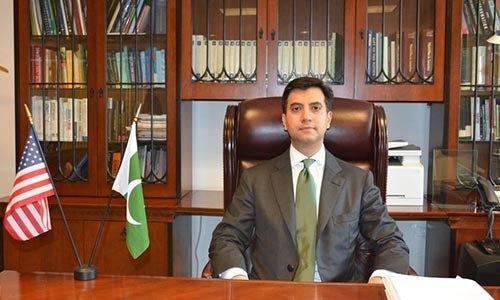Pakistan envoys posted on political grounds may be recalled: FO

ISLAMABAD: In what looked to be a word of caution for the non-career politically appointed ambassadors serving in different capitals across the world, the Foreign Office on Thursday suggested that many of them would soon have to pack their bags.
“According to their contract, non-career ambassadors are deemed to have resigned, unless the new government decides otherwise,” Foreign Office Spokesman Dr Muhammad Faisal said in response to a question about the ambassador to the United States, Ali Jehangir Siddiqui.
The future of politically appointed ambassadors has been hotly debated since the Pakistan Muslim League-Nawaz government completed its tenure on May 31.
Indian attempts to make demographic changes in held Kashmir assailed
The PML-N had during its tenure appointed 21 ambassadors on political grounds, some of whom have already left on completion of their contract. The remaining ones, too, as per diplomatic norm, are expected to stand down with the change in government.
The two interesting cases of political appointees are that of Mr Siddiqui, who presented his credentials to President Trump three weeks after the PML-N government left office, and High Commissioner to Canada Tariq Azim, who was granted a two-year extension in the service contract shortly before the PML-N government’s tenure ended.
The Pakistan Tehreek-i-Insaf (PTI) had taken a strong position against the appointment of Mr Siddiqui and it may be difficult for the party to step back unless the other powerful stakeholders in the Foreign Policy arena intervene in his favour, about which many are already speculating.
Another high-profile political appointee, Permanent Representative at the UN in New York Dr Maleeha Lodhi, who met PTI chairman Imran Khan a few days ago for what the FO described as a private meeting, is being tipped to be retained in her position.
Saudi Arabia stance backed
Pakistan has sided with Saudi Arabia in its latest diplomatic spat with Canada.
“Pakistan stands by the Kingdom of Saudi Arabia in protecting its sovereignty as a matter of principle and based on the historic and brotherly relations between our two countries,” the spokesman said.
The spat between Saudi Arabia and Canada started after Canada’s Foreign Minister Chrystia Freeland tweeted to demand release of women’s rights activist Samar Badawi. Later, the Canadian government called for immediate release of jailed activists.
The Saudi government took strong exception to the Canadian criticism of the treatment of rights activists in the Kingdom and expelled Canada’s ambassador besides recalling its own ambassador from Ottawa.
Besides, Pakistan’s solidarity with a Muslim country and its position on sovereignty of states and the principle of non-interference in the internal affairs of other states, the stance taken by the FO is driven by its uneasy relationship with Canada, a diplomatic source revealed.
The Pakistan government is unhappy with Canada over its discriminatory visa policy towards Pakistanis, negative travel advisory and Canadian high commissioner in Islamabad’s attitude towards the host government.
Responding to a question about re-imposition of US sanctions on Iran, the spokesman took a cautious position.
“We are examining the implications of the US re-imposition of sanctions on Iran. However, Pakistan, being a sovereign state, reserves the right to pursue legitimate economic and commercial interests while respecting the international legal regime,” the spokesman said.
Kashmir
In reply to a question about demographic changes India is trying to bring about in held Kashmir by abrogating Article 35-A of the Indian Constitution, the FO spokesman said that this was not the first time that India was trying to do so, adds APP
“They (Indian leaders) have been trying to do it for the last 70 years. This is a direct violation of the UNSC Resolutions. We have consistently been raising this issue on all international forums and shall continue to do so,” Dr Faisal said.
He said that India could not crush the legitimate, indigenous Kashmiri struggle by such nefarious, underhanded means.
“All such Indian efforts have failed in the past and they will continue to fail in future also,” he added.
“The only solution to the Jammu and Kashmir dispute is through the realisation of the right to self-determination of the people of Kashmir through an impartial UN-administered plebiscite in accordance with UNSC Resolutions,” the spokesman said.
Published in Dawn, August 10th, 2018













































